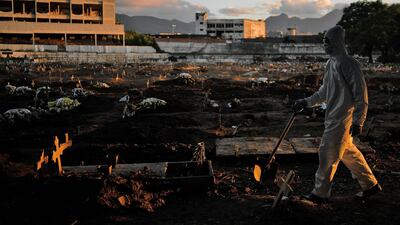The World Health Organisation reported a second consecutive record daily increase in coronavirus cases on Saturday, with 259,848 new infections worldwide.
There were 237,743 new cases on Friday, underlining a resurgence of the virus that took the number of infected past 14.5 million people and deaths to more than 600,000.
The United States tops the list with 143,035 deaths. It is followed by 78,871 fatalities in Brazil and 45,300 in the United Kingdom, according to tallies kept by Worldometer.
Out of the number of confirmed infections worldwide, more than 3.8 million are in the United States. There are over 2 million in Brazil and more than 1.1 million in India.
While the US leads global infections, South Africa now ranks as the fifth worst-hit country in the pandemic with more than 350,000 cases, or around half of all those confirmed on the continent. Its struggles are a sign of trouble to come for nations with even fewer health care resources.
The pandemic, which has spawned economic mayhem worldwide, also saw the G20 - the world's most industrialised nations – consider extending debt relief for coronavirus-hit poor countries in the second half of 2020.
In Europe, where infections are far below their peak but local outbreaks are causing concern, leaders of the 27-nation European Union haggled for a third day in Brussels over a proposed €1.85 trillion EU budget and coronavirus recovery fund.
As scientists around the world race to find a vaccine to halt the pandemic, Russia's ambassador to Britain on Sunday rejected allegations by the United States, Britain and China that his country's intelligence services have sought to steal information about vaccine efforts.
“I don’t believe in this story at all, there is no sense in it,” Ambassador Andrey Kelin said when asked in a BBC interview about the allegations. “I learned about their [the hackers'] existence from British media. In this world, to attribute any kind of computer hackers to any country, it is impossible.”
Infections have been soaring in US states such as Florida, Texas, Arizona, with many blaming a haphazard, partisan approach to lifting lockdowns as well as the resistance of some Americans to wearing masks. Los Angeles Mayor Eric Garcetti said Sunday that the situation was so dire in his California city that authorities were considering a new stay-at-home order.
Even where the situation has been largely brought under control, new outbreaks are prompting the return of restrictions.
Following a recent surge in cases, Hong Kong made the wearing of masks mandatory in all public places and told non-essential civil servants to work from home. Hong Kong leader Carrie Lam said the situation in the Asian financial hub is “really critical” and that she saw “no sign” that it was under control.
Police in Barcelona have limited access to some of the city’s beloved beaches because sunbathers were ignoring social distancing regulations amid a resurgence of coronavirus infections.
Cases in the Australian state of Victoria rose again on Sunday, prompting a move to make masks mandatory in metropolitan Melbourne and the nearby district of Mitchell for people who leave their homes for exercise or to purchase essential goods.
Victoria Premier Daniel Andrews said those who fail to wear a mask will be fined 200 Australian dollars.
“There’s no vaccine to this wildly infectious virus and it’s a simple thing, but it’s about changing habits, it’s about becoming a simple part of your routine,” Mr Andrews said.
Speaking on Sunday from his window overlooking St Peter’s Square, Pope Francis renewed his appeal for an immediate worldwide ceasefire that he said “will permit the peace and security indispensable to supplying the necessary humanitarian assistance”.

